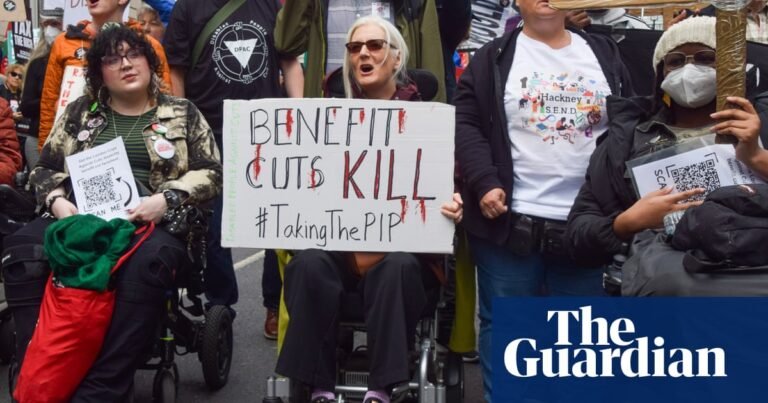Sadiq Khan has become the most senior Labour figure yet to urge the government to drop its controversial disability benefit changes, supporting a growing Labour rebellion that threatens to derail the plans.
The London mayor warned that the welfare bill, which more than 100 Labour MPs have already threatened to vote against in the Commons next week, would “destroy the financial safety net” for millions of people.
He joined Labour rebels, including senior committee chairs and former shadow ministers, in calling for the government to pause the legislation and bring forward the promised £1bn to get more people into work first.
However, Keir Starmer has said he will press ahead with the overhaul, despite widespread fury within his own party, as he said there was a “clear moral case” for change.
Speaking on his way to the Nato summit in The Hague, the prime minister defended plans to tighten the eligibility criteria for personal independence payment (Pip), arguing that the current system was unsustainable.
“There is a clear moral case, which is: the current system doesn’t help those who want to get into work,” Starmer said. “It traps people. I think it’s 1,000 people a day going on to Pip. The additions to Pip each year are the equivalent of a city the size of Leicester. That is not a system that can be left unreformed.”
When asked if he would consider delaying the vote due to the scale of opposition, Starmer replied: “We were elected to change what is broken in our country. The welfare system is broken, and that’s why we will press ahead with our reforms. It’s very important that we do so, because the current system is not working for anybody.”
Liz Kendall, the work and pensions secretary, is locked in talks with MPs as she seeks to win over opponents. Cabinet ministers including Angela Rayner, Jonathan Reynolds and Wes Streeting are also understood to have been deployed to try to convince anxious backbenchers.
The size of the rebellion is enough to threaten Starmer’s working majority of 165 and defeat the government’s plans if opposition MPs side with the Labour rebels. The government could opt to pull the bill rather than face defeat.
While 108 Labour MPs, led by the Treasury select committee chair, Meg Hillier, have signed the amendment calling for the government to pause the bill, the number of rebels is expected to be even higher.
Vicky Foxcroft, a former government whip who resigned over the welfare plans, has also signed the amendment, along with the former cabinet minister Louise Haigh. More frontbenchers, who would then have to stand down, are expected to join the rebellion.
The amendment raises concerns that the proposals could push up to 250,000 people, including 50,000 children, into poverty.
It also criticises the government for failing to publish the Office for Budget Responsibility’s impact assessment before the vote, and for pursuing changes without adequate consultation with disabled people.
The proposed legislation would make it harder to qualify for Pip by requiring claimants to meet a higher threshold in their assessments. It also includes plans to halve the health top-up in universal credit for new claimants from 2026 and phase out the Work Capability Assessment.
Khan said: “I have always said that more must be done to support people to go from relying on benefits to getting back into work. It’s vital for a healthy and prosperous London. What we can’t do is take away the vital safety net that so many vulnerable and disabled Londoners rely upon.”
He urged ministers to “look again” at the hardship the changes would force on vulnerable and disabled people. He said the additional employment and training support promised should be brought in as soon as possible, and proper transitional protections put in place before benefits were cut.
Analysis for the Greater London Authority found that Londoners would lose £820m in total as a result of the proposed changes to Pip and universal credit, with 360,000 mostly poor, vulnerable and disabled people facing a reduction in their incomes.
It found the tighter eligibility criteria for Pip would affect up to 46% of current claimants and mean disabled Londoners face losses of between £3,800 and £5,700 per year.
Hillier said: “We all want the Labour government to succeed in getting people back into work and supporting those who can’t. We don’t want to defeat the government but we want the government to think again.”
The amendment was announced after Kendall addressed a private meeting of MPs at which she told them there was “no route to social justice based on greater benefit spending alone”.
The prime minister’s official spokesperson said Downing Street “recognises the strength of feeling” about the welfare changes, but reiterated the case for reforming a “broken” system.
Asked whether concessions would be offered, a No 10 spokesperson said: “We’ll talk to them over the next week but the government believes this is a good package of reforms. We hope that colleagues will engage positively over the next few days.”
The Cabinet Office minister Pat McFadden said on Tuesday it would be a “very serious thing” for Labour MPs to effectively vote down the legislation at its first major outing in the Commons. But he added that ministers would continue talking to MPs.
Disability charities have criticised the changes, warning they will disproportionately impact people with mental health conditions, women with fluctuating illnesses, and unpaid carers.


